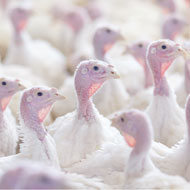
Recommendations for global policy on welfare adopted
The United Nations has adopted ground-breaking recommendations for global policy on animal welfare in farming. Language has been included to make it clear that member countries should prioritise animal welfare when designing their farming systems.
After two years of lobbying by World Animal Protection, the new recommendations were agreed at the UN Committee on World Food Security meeting in Rome.
World Animal Protection's international head of policy, Lesley Mitchell, said: "This change by the UN is a massive step forward in putting animal welfare at the front and centre of farming. It means countries will no longer ask 'should we include animal welfare?' but 'how do we deliver better animal welfare?'"
The language emphasises that animals should be able to display natural behaviours and live free from pain, distress and hunger, as set out by the Five Freedoms and World Organisation for Animal Health (OIE) standards and principles. The recommendations, which were informed by a high level panel of experts, also stress the importance of access to veterinary services.
Lesley Mitchell added: “By treating animals well, we can fight poverty, reduce hunger, improve people’s health, tackle climate change and protect the biodiversity of our planet. We’ve been working to make sure the vital importance of animal protection is recognised at a global level.
"This is clear acknowledgement that better animal welfare contributes to better food security for communities, which in turn helps to tackle sustainable development goals to end hunger, achieve food security and improved nutrition and promote sustainable agriculture."
World Animal Protection says it will continue to work with key countries to implement the recommendations in policy and in practice.



 The latest
The latest